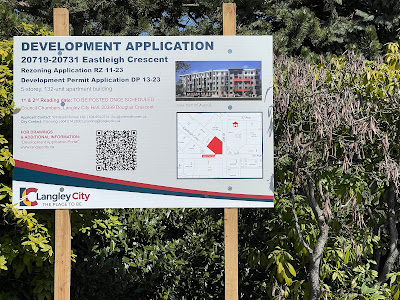Since I was first elected to Langley City Council in 2016, there has been a
steady stream of housing projects, and the number of projects has been ramping
up over the years. This year, I’ve noticed a decline in new projects.
While many housing projects are still under construction, new submissions have
stalled. Langley City has an Advisory Design Panel, which includes experts and
regular community members who provide feedback on proposed development
projects. Last year, this committee reviewed about a dozen housing projects.
This year, the committee has reviewed five projects to date. You might think
that the number of projects seems to be tracking the same as last year, but
there are a few things to consider.
For one project, the applicant decided to cancel the project. Another project
was the
B.C. Builds projects, funded with the help of the provincial government, low-cost land from the
City, and a church providing land. The last time the Advisory Design Panel met
was in April.
I heard from elected folks in other Metro Vancouver communities that new
housing projects have also slowed down in their communities.
A recent report
from the Canada Mortgage and Housing Corporation found that we need to double
the amount of new housing built annually to restore affordability to the
Canadian housing market.
The federal government has recently reduced immigration numbers. Many people
thought this would allow the housing supply to “catch up.” If new housing
construction is also slowing down, we may not see this “catch-up.”
Talking to home builder, they say financing costs, material and labour costs,
and even the fees local government charges (which are needed) puts the price
of housing above what the market can bear. These costs mean that projects are
simply not moving forward.
So, what are the solutions? A few ideas come to mind that are easy to say but
require more effort to implement.
The government must expand financing programs that provide low—or no-interest
loans, such as the current
Apartment Construction Loan Program. Modernizing construction, such as with modular housing, to reduce costs and
speed up the timeline is more challenging but necessary.
While the federal government is now doing more to manage the demand for
housing, we still need to “catch up” to deliver more affordable housing.



























